#mezzo-sopranos
Text
domingo - 01. 10. 2023
Lovable mezzo-sopranos 🩵🎵
The fact that SJM has always loved Taylor Swift - and now her son is obsessed with her too (that’s so freaking cute 🤏🥹✨mini swiftie)
"Taran is obsessed with Taylor Swift. Aren't we all?"
"I've always loved her. I think she's an incredible creator and like businesswoman and I have so much respect for her."
“But now that Taran is obsessed with her- like, we've only listened to her music in the car. That's it, like all summer long."
I also love TS and I LOVE that SJM made Gwyn a mezzo-soprano too so that I can imagine Gwyn singing every time I listen to a Taylor Swift song 🥹🩵
my favorite mezzo-sopranos 🥰🙌


acosf - chapter 52
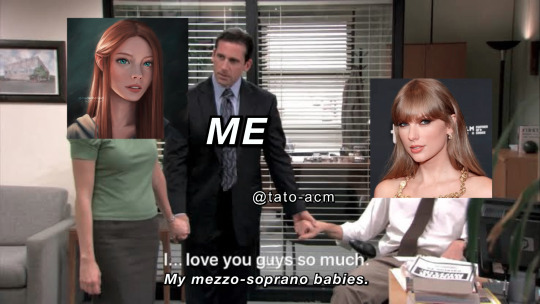
Gwyn’s playlist (mezzo-soprano artists - mostly TS 😌)
#gwyn berdara#sarah j maas#gwynriel#gwyneth berdara#gwyn playlist#mezzo-sopranos#taylor swift#mezzo soprano#gwyn x taylor swift#sjm#sjm interview#acotar 5#acosf
74 notes
·
View notes
Text


5 Minutes That Will Make You Love Mezzo-Sopranos
January 5, 2022
In the past we’ve chosen the five minutes or so we would play to make our friends fall in love with classical music, piano, opera, cello, Mozart, 21st-century composers, violin, Baroque music, sopranos, Beethoven, flute, string quartets, tenors, Brahms, choral music, percussion, symphonies, Stravinsky, trumpet, Maria Callas, Bach and the organ.
Now we want to convince those curious friends to love mezzo-sopranos, the warm-toned bringers of humanity to opera. We hope you find lots here to discover and enjoy; leave your favorites in the comments.
In the past we’ve chosen the five minutes or so we would play to make our friends fall in love with classical music, piano, opera, cello, Mozart, 21st-century composers, violin, Baroque music, sopranos, Beethoven, flute, string quartets, tenors, Brahms, choral music, percussion, symphonies, Stravinsky, trumpet, Maria Callas, Bach and the organ.Now we want to convince those curious friends to love mezzo-sopranos, the warm-toned bringers of humanity to opera. We hope you find lots here to discover and enjoy; leave your favorites in the comments.
◆ ◆ ◆Susan Graham, mezzo-soprano
Why should you love mezzos? We’re the opera world’s salt of the earth. We’re the mother, the boyfriend, the impish page. We’re the sister, the princess, sometimes the goddess. OK, we’re also occasionally the witch!
With apologies to my soprano sisters, our lower tessitura offers a warmer tone, as well as words that are more discernible in a range closer to speech. We’re slightly more relatable, if you will. We’re the viola, sometimes the cello, and we often strive for that richness and comfort. The following is an example of glorious vocalism by one of my idols and mentors: Christa Ludwig. She taught me Octavian, and her recordings taught me Mahler, Strauss, Schubert and Wagner. Here she is spinning out Brahms, accompanied by Leonard Bernstein.
◆ ◆ ◆J’Nai Bridges, mezzo-soprano
I would play an aria almost everyone has heard many times: “L’amour est un oiseau rebelle” — the “Habanera” from “Carmen.” The clarity and beauty of Grace Bumbry’s tone and the playfulness of her expression made me instantly fall in love, and I can imagine it would at the very least pique the interest of a newcomer. (The music is more than enough, but watching her sing it on film would truly leave anyone hooked.)
◆ ◆ ◆Kayleigh Butcher, mezzo-soprano
When I was in high school, my choir teacher played a Grace Bumbry CD. I loved it so much that I took it home with me. This piece was one of the few arias I had heard at that point that just sounded fun to sing. Her voice is so buoyant and light, yet also strong and fervent. And her breathing technique is so skilled at handling Handel’s long, melismatic lines. Her expression sounded so easy and free. It all spoke to me, so intensely, at a young age.
◆ ◆ ◆Zachary Woolfe, Times classical music editor
These five minutes changed my life. When I was about 10, I somehow got my hands on a CD of songs and arias featuring Marian Anderson. I played her “Ave Maria” again and again, with its halo of static hovering around her mellow tone, an emissary of beauty from long ago. It was how I fell in love with classical vocalism, and with opera. As always with Anderson, the singing is dignified, even decorous. But in her steady, intense swells of volume, you can’t help but feel the power of belief, breath, body. Sensuality is not absent from her artistry.
◆ ◆ ◆Marilyn Horne, mezzo-soprano
There were many singers who influenced me and whom I tried to emulate: Risë Stevens, Janet Baker, Renata Tebaldi, Rosa Ponselle, Victoria de los Ángeles, Conchita Supervía. But I think the one I really paid the most attention to when I was 18, 19, 20, was Ebe Stignani. I did a lot of research on her, and I played her records constantly. I adored her particular legato, which was just extraordinary in “Orfeo,” and the “Samson et Dalila” arias.
◆ ◆ ◆Cecilia Bartoli, mezzo-soprano
When I was a student, I used to listen to and admire a lot one of the very great Rossini specialists, Marilyn Horne. I especially appreciated and studied her legendary interpretations of male characters, such as Malcolm in “La Donna del Lago” and Arsace in “Semiramide.” In 1988 she recorded something different: Vivaldi’s “Orlando Furioso.” I was spellbound by the vocal fireworks, and Horne’s interpretation was the initial inspiration for my later Vivaldi projects. Thank you, dear Marilyn!
◆ ◆ ◆Matthew Epstein, vocal coach and impresario
I can hear this performance in my head: It was the first cut on the album “Presenting Marilyn Horne,” which came out in 1965. And if there was a part that fully suited her, it was Isabella in “L’Italiana in Algeri.” She was still called a soprano in those days, and there was the combination of that very strong lower register, even from the start, with a lightness, especially in this early recording. She goes way up in the cadenza to the high C. There’s lightness and flexibility to the sound, and dynamic variation — her amazing use of soft dynamics. She sings with such sweetness but also so much strength.
◆ ◆ ◆Jamie Barton, mezzo-soprano
When I think mezzo, the first name that comes to mind is Marilyn Horne. Her recordings of florid arias by Rossini, Vivaldi and Handel are widely known, but this gorgeous aria from Ambrose Thomas’s “Mignon” is well worth a trip off the beaten path. In under five minutes, you have a scena that is chock-full of beautiful long lines and gargantuan leaps that challenge the extremes of her seemingly limitless voice.
◆ ◆ ◆Amirtha Kidambi, composer and vocalist
A classical mezzo-soprano who later defected to free jazz, I was a contrarian who avoided the most beloved repertoire. I gravitated to what was then considered niche, digging into zarzuela and Spanish and Latin American art song, which brought me into contact with the rich voice of Teresa Berganza. She is known for interpretations of Rossini and Mozart, but when I was knee-deep in Manuel de Falla’s “Siete Canciones Populares Españolas,” I studied Berganza’s recordings closely, mesmerized by her delicacy and sensitivity to the folkloric ornamentation. In this live performance from 1960, “Polo” showcases her brilliant coloratura, moving seamlessly in and out of brute-force chest voice.
Back to free jazz, when I met my musical hero Cecil Taylor, the virtuosic improvising pianist, I told him I was a vocalist. He took my hands in his and spoke low and close. Though I couldn’t grasp every word, he clearly repeated “Teresa Berganza” in a raspy whisper. I felt a cosmic vibration in our hands and shook my head vigorously, grinning in agreement.
◆ ◆ ◆Denyce Graves, mezzo-soprano
It may be partly because I’m a huge Cecilia Bartoli fan, partly because it is just so heartbreakingly glorious, and partly because it’s a challenge to sing well. But I love this aria. It challenges your stamina in terms of breath control, line, trill and the ability to convey deep emotional sentiment. You need fire in your belly and a core of steel and calm to be successful.
◆ ◆ ◆Javier C. Hernández, Times classical music and dance reporter
Some mezzos specialize in so-called trouser roles, assuming the identity of young male characters. One of the best known trouser parts is Cherubino, the mischievous teenage page in Mozart’s “Le Nozze di Figaro.” In this recording, Frederica von Stade, a classic Cherubino, sings with luster and comedic flair.
◆ ◆ ◆Anthony Tommasini, former Times chief classical music critic
Many mezzos can sound a little forced trying to bring chesty power to their low range. Not the great Shirley Verrett, as in this thrilling account of “O don fatale” from Verdi’s “Don Carlo.” Her deep, rich lower voice has smoldering natural power and textured beauty. Yet during soaring flights, she tosses off top notes that any soprano would covet. (It’s no surprise that she also took on major soprano roles.) Combining vocal magnificence with dramatic intensity, Verrett’s Princess Eboli sounds impassioned and remorseful in cursing the allure of her own beauty.
◆ ◆ ◆David Allen, Times writer
“I am lost to the world,” this song begins, even though the music can be relied upon to pull me back into it — consoling on the darkest of nights, or in the deepest of griefs. With its winding English horn and ethereal mezzo line, never more magically sung than by Janet Baker in 1967, Mahler’s shortest masterpiece is a love song, though a forlorn one. Our singer is lost to the world, and she insists that she is content with that, as her voice takes flight. But there are few simple joys here — rather a profound ambivalence. Suspensions linger everywhere, their exquisite agonies taking time to resolve. Is this the bliss of solitude? Heaven? Love? No, the final words reveal: It is the rapture of song.
◆ ◆ ◆Kamala Sankaram, composer
For me, the beauty of the mezzo voice is synonymous with Mahler. And while I do have a soft spot for the “Rückert-Lieder” (“Um Mitternacht,” in particular), the piece that first moved me, introducing me to the warmth of mezzos, is his “Kindertotenlieder.” In “Nun will die Sonn’ so hell aufgeh’n,” the first song in the cycle, the sparseness of the orchestration allows the simplicity and purity of the voice to really shine. The beautiful legato of Janet Baker’s sound is colored by the emotion she wrings out of the text. It gets me every time.
◆ ◆ ◆Seth Colter Walls, Times writer
Emmerich Kalman’s operetta “The Duchess of Chicago” was a hot ticket in Vienna in 1928. Kalman drew from his intimate knowledge of Hungarian dances and what he was able to learn of cutting-edge American styles like the Charleston. Among the numbers is this tune, which introduces Mary, the duchess of the title, who buys and sells European potentates at will. While the part was originally written for a soprano, a mezzo like Julia Bentley can emphasize the ironies of the libretto. Mary already seems to know that money isn’t everything — even as the dollar-fueled flexing of Americana is heard in the rhythm.
◆ ◆ ◆Jennifer Higdon, composer
One of the joys of being a composer is exploring performers’ gifts before writing for them. Occasionally, I encounter a beauty and skill that takes my breath away, making me pause with wonder and admiration. Such performances become springboards of inspiration. I recently experienced this while listening to the mezzo-soprano Sasha Cooke, heard here in a lullaby and conveying the sound of effortless beauty and calm from a most artful voice.
◆ ◆ ◆Joshua Barone, Times editor
In opera, the spotlight tends to gravitate toward sopranos. But there have been exceptions, mostly in France, of leading female roles for mezzo-sopranos: the Carmens and Dalilas of the repertory. Among my favorites are those written by Berlioz, like Didon of “Les Troyens” and Marguerite of “La Damnation de Faust.” His song cycle “Les Nuits d’Été,” which has been adapted for different voice types, also sounds best in the mezzo tessitura. Hear how the deeper, rich-bodied lyricism in “Le spectre de la rose” complements the orchestration — at its most delicate, with pattering winds and pizzicato strings — then blossoms into a beaming high note with a mezzo-soprano’s trademark versatility.
◆ ◆ ◆Michael Cooper, Times editor
Some of the most intoxicating music in Wagner’s “Tristan und Isolde” is given not to the doomed lovers, but to Brangäne, Isolde’s hapless maid. Listen to Christa Ludwig sing her song of warning in the second act: standing watch over a tryst, her rich, otherworldly mezzo floats above the ethereal colors of the orchestra. Its spell is all the more powerful because of how it unfolds. The audience, which has just listened to an ecstatic, frenzied love duet, suddenly hears Brangäne’s distant warning as she tries in vain to pierce the rapturously beautiful music of their passion.
◆ ◆ ◆Joyce DiDonato, mezzo-soprano
One of the great mysteries of classical music is how composers can craft the most achingly beautiful music from the most tragic of emotions, simultaneously evoking pure sadness and astonished tranquillity, and perhaps even inviting acceptance. It takes a special artist to channel music in such a mystical way, and there have been few better marriages than that of Franz Schubert and Janet Baker. In this song, written in 1816, a mother sings a simple lullaby to her baby son, who has just died. Listen as Janet’s voice comforts, cries, calms and loves.
◆ ◆ ◆
The post 5 Minutes That Will Make You Love Mezzo-Sopranos appeared first on New York Times.
0 notes
Text
I HATE when I apply for stuff and they ask me my preferred pronouns or gender on the application process bc it's like. Are you transphobic and using this as a filter for people with weird pronouns and I need to lie to you right now, am I going to lie and then get accepted and constantly misgendered regardless of whether you would have been chill about it or not bc of what I put on this app, am I literally freaking out for no reason right now
#just putting she/her like. look at me I'm so normal. I'm soooo cisgender#eughhh#not like i can lie about my agab on an application where i also habe to put 'mezzo-soprano' lol#i talk
509 notes
·
View notes
Text

Tsianina Redfeather, a famous Creek/Cherokee singer and performer, early 1900s.
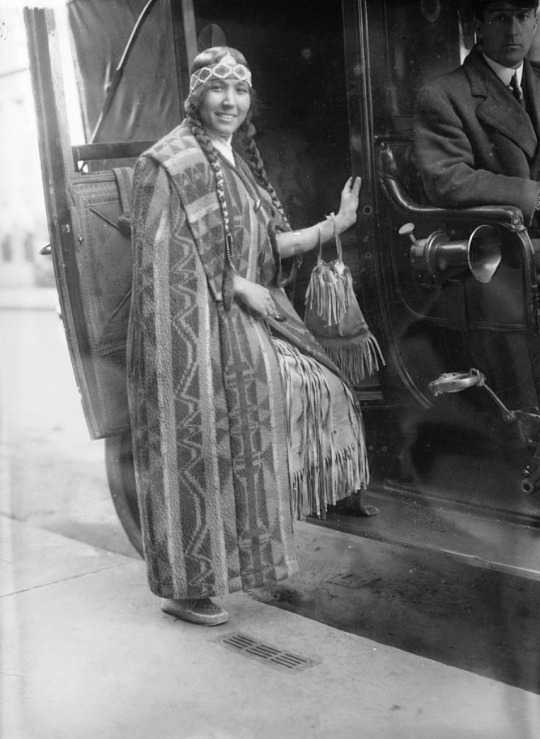

The Forgotten History of Tsianina Redfeather, the Beloved American Indian Opera Singer
Throughout the United States and Europe, newspapers, music critics, government leaders and royal nobles raved about the captivating voice of mezzo-soprano Tsianina Redfeather. The Muscogee singer’s perfect enunciation, great vocal range, superb legato, exquisite musical intelligence, genuine presence, and overall graceful charm were the talk of every town.
Tsianina (pronounced Cha-nee-nah) Redfeather was a national superstar.
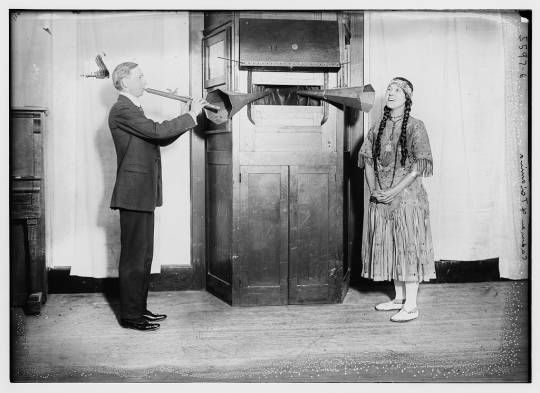
#bw#Tsianina Redfeather#Cherokee#creek#Florence Tsianina Evans#mezzo-soprano virtuoso#Indianist movement#cliff clavin
177 notes
·
View notes
Text
hit me with your best explanation for why the homeric sirens are a pair instead of a trio the way female collectives in greek myth/literature usually are (the fates, the graces, the graeae, the horae, the gorgons, the muses who are a trio of trios)
#dark odyssey show me the forbidden mezzo-soprano siren#my current working explanation is that the composition of the odyssey dates to when the dual was falling/recently fallen out of use#so the poet/bard/redactor/whatever wanted to use it because it sounded archaic#but thats boring on the symbolic level#odysseyblogging#mine
61 notes
·
View notes
Text


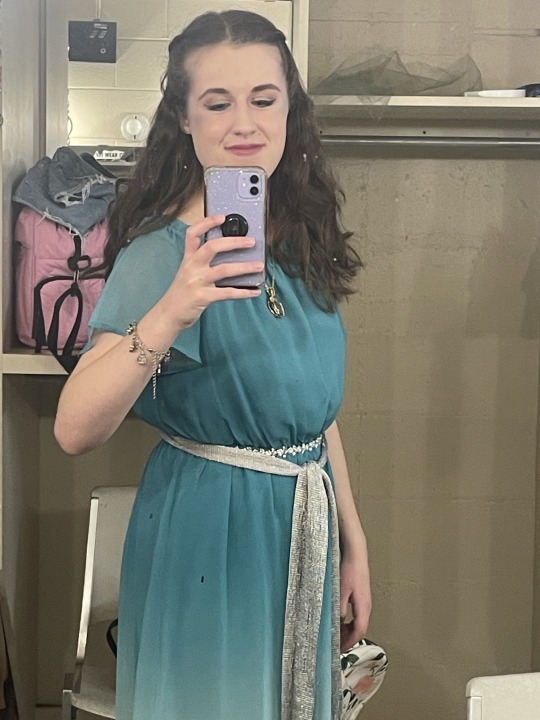
So proud of the work I’ve gotten to do on my collegiate opera debut! Iolanthe opens TONIGHT, and I can’t wait to introduce everyone to my interpretation of this sweet, courageous and free spirited fairy that I’ve grown to love so much.
34 notes
·
View notes
Text

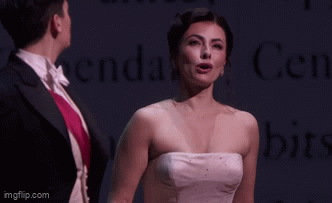
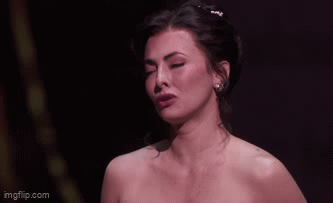


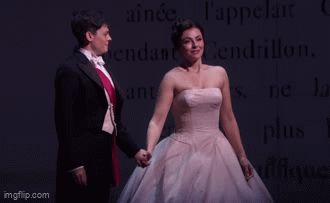
you are my charming prince.
and if I could choose, I would choose you.
Oh, how I wish I did not have to lose you
the very moment that we met...
#opera#opera tag#cinderella#cinderella opera#cendrillon#cendrillon opera#mezzos#mezzo-soprano#emily d'angelo#isabel leonard#divas#fairy tales#fairy tale opera#opera gifs#cendrillon gifs
26 notes
·
View notes
Text
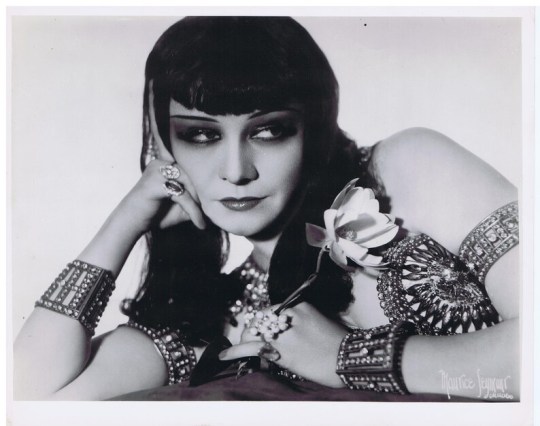

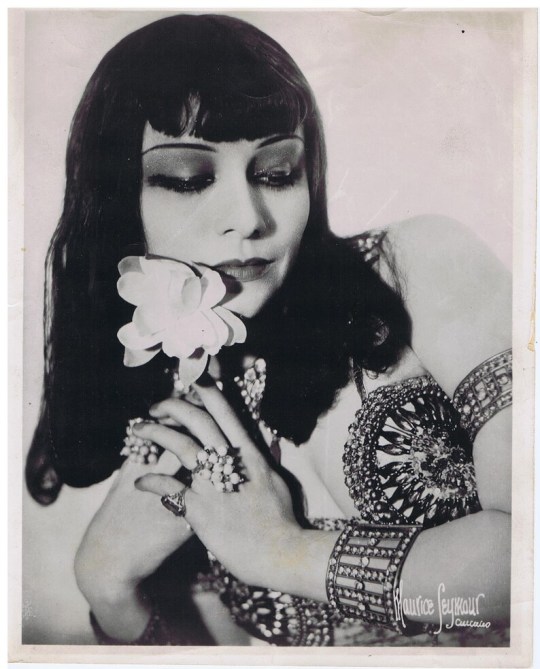
Coe Glade As Amneris (of Aida) by Maurice Seymour
87 notes
·
View notes
Text

This is a very rare item. November 16. 1908 was the first time Arturo Toscanini conducted at The Metropolitan Opera. This was also the first appearance of 4 other great names. A historical evening 115 years ago.
#music history#bel canto#classical studies#maestro#chest voice#Arturo Toscanini#conductor#Aida#Giuseppe Verdi#Emmy Destinn#dramatic soprano#soprano#Metropolitan Opera#Met#Louise Homer#dramatic contralto#contralto#Leonora Sparkes#mezzo-soprano#Enrico Caruso#lyric tenor#dramatic tenor#tenor#Antonio Scotti#baritone#Adamo Didur#bass#Giulio Rossi#Angelo Badà
20 notes
·
View notes
Text
youtube
"Al Fa/Chanterai por mon Courage", by Eugénie de Mey (and Pierre Hamon, Julien Lahaye) (Trobar Project Exils), from "Celles qui restent, Celles qui partent…"
19 notes
·
View notes
Text
#GUESS WHO WALKED INTO THE JOINT WITH HIS LEFT ARM IN A FUCKING SLING AND PROCEEDED TO DOMINATE?#absolutely incredible display of power from suzuki + olivia vermeulen's dummy robust mezzo soprano + tim mead's sickass countertenor#ANDDDDDDDDDD EMI FERGUSON ON FLUTE DEBRA NAGY ON OBOE#oh man last time i saw suzuki conduct the mass in b was 7 years ago—i never thought i'd see him do it live again#johann sebastian bach#audiopost#classical music#masaaki suzuki#Spotify
17 notes
·
View notes
Note
hello!
I’m looking forward to a production of Into the Woods. I’m a teenager in high school and the eldest person auditioning. I don’t know much about singing. My range is G5-A3. Apparently my voice is very sweet sounding and whenever I sing I sound sad.
My main question is knowing which role to go for and maybe recommendations for the song for the role. I’m sorry if this is too much to ask. Also if you have any additional questions please ask.
That's exciting! Based on your range and the description you've given, Little Red, Jack's Mother, and Cindy's Step Family (Step mother, Florinda, and Lucinda) are all within your range (Granny is also possible, but since she only really sings in an ensemble capacity, we'll leave her out in terms of audition material). Sweet and sad may also get you considered for Cinderella's Mother (a little high for you as it goes up to an A5, but don't count yourself out. A whole step is a totally possible stretch to make at that place in the voice. And if you can stretch up to that, Rapunzel is also possible and fitting for your tone quality).
For Little Red: The Glamorous Life from A Little Night Music (the film version--one of the few good things about that film adaptation. Audra McDonald has a beautiful rendition you can reference); Everlasting from Tuck Everlasting; or, if you can find a solo cut, I Know It's Today from Shrek (this cut of Morning Person would also work well)
For Jack's Mother and/or Cinderella's Stepmother: Wait from Sweeney Todd or Sensitivity from Once Upon a Mattress
Cinderella's Mother/Rapunzel: Come to my Garden from the Secret Garden or One More Kiss from Follies.
Florinda/Lucinda: Stepsister's Lament from the R&H Cinderella (very on the nose as a choice, but fun) or (perhaps a little young and bratty, but so very step sisters) I Want it Now from Willy Wonka and the Chocolate Factory.
As for which one to go for, that's something I can't really advise on without knowing how tall you are compared to the other kids auditioning, how old you read next to them, actually hearing your voice, etc. Go for the role that most speaks to you.
Break a leg!
#Mezzo Soprano#Alto#musical theatre#broadway#audition suggestions#audition songs#musicals#Into the Woods#soprano
11 notes
·
View notes
Text
day one of pretending to be a mezzo in front of a live audience. gripping the sink crying tears of blood. [jfj voice] im a fake brother
#a girl like me will do amazing things to be seen#i mean its an amateur audience no one will know. but I will. and it wouldnt be a big deal at all if i havent been saying all these years#that i fucking hate it when singers who are so very clearly sopranos sing as mezzos and they're not even Good at it#but its whatever. the most important thing in singing outside of your fach is to have fun and be yourself <3
7 notes
·
View notes
Text
There has never been a love greater nor more tragic than my love for musical theatre songs extraordinarily outside of my vocal range
#YES this is about you'll never walk alone from carousel#or anything christine sings in phantom#or any soprano piece ever really#i just want to sing pretty high notes but my mezzo range says no#brain dump with cc#musical theatre#carousel musical#phantom of the opera#gentleman's guide to love and murder
25 notes
·
View notes
Text

10 notes
·
View notes
Text
Centaurworld musical numbers didn't have to go so hard
54 notes
·
View notes